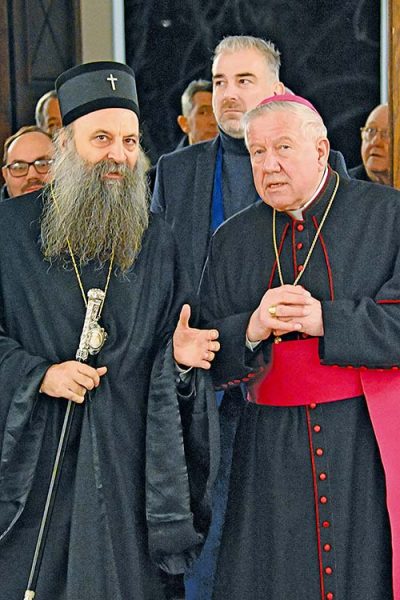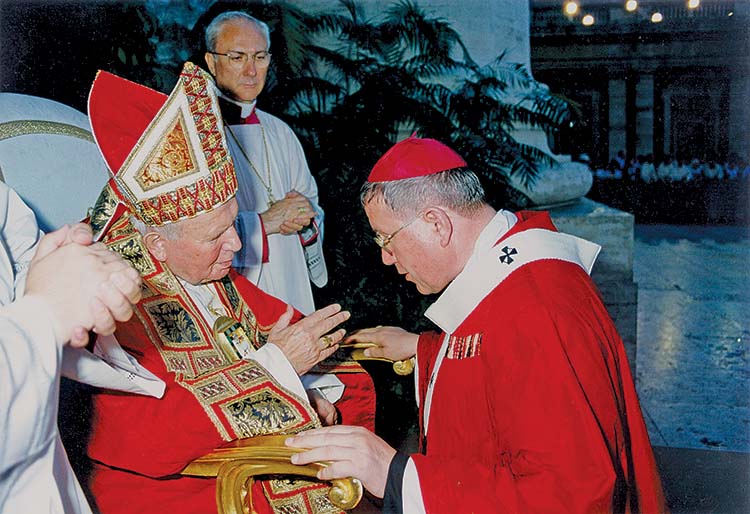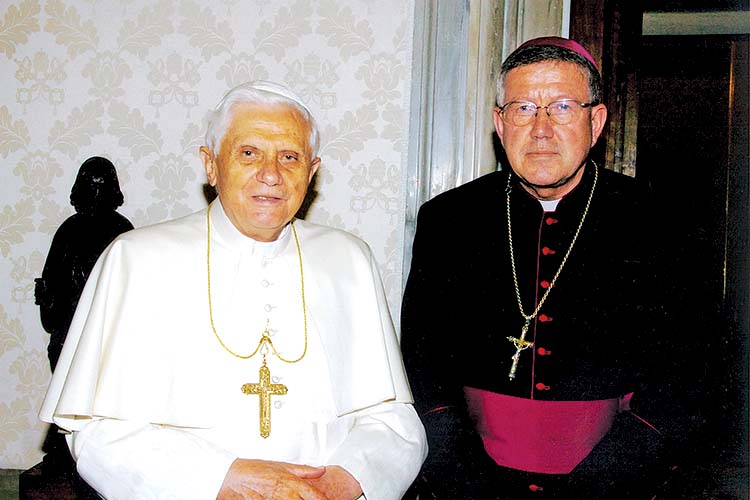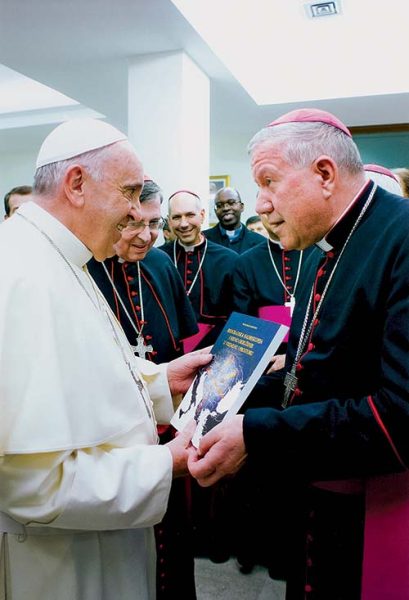When I arrived Belgrade, in public, in public gatherings and receptions, I felt like a black sheep. So many eyes always reflexively questioning me, as if asking: “And what do you want here?”, “Well, the Vatican is to blame for everything” etc. While now many individuals and groups are aware that we have no future without a dialogue between East and West – Msgr Stanislav Hočevar
It was 22 years ago that Archbishop Stanislav Hočevar arrived Belgrade, choosing as his veritable slogan to “Joyfully serve the Lord”. And that motto has guided him throughout this entire time, which has included lots of turmoil and tough events, but also beauty – primarily the beauty embodied in human encounters.
Here we discuss the current geopolitical juncture – the war in Ukraine, social divisions and the need for unity and wholeness, but also the Catholic Church’s position in Serbia, the possible arrival of the Pope, relations with the Christian Orthodox faith and how Archbishop Hočevar views the time he’s spent in Serbia now that he’s reaching the end of his tenure.
The war in Ukraine, society and states divided sharply, hostility towards minorities growing – this is the reality in which we live. What role should the Church have in such a world and, in your opinion, how much do they fulfil that role? Do you hear Christian voices during these times?
I wouldn’t want, first and foremost, to proclaim “big” words about that topic, because today, unfortunately, there are entire societies turning into caricatures.

Everyone is rushing to utter “big” words about unimportant and incidental things, while the actual big questions of life aren’t even considered or discussed at all… That’s simply not on the agenda of those who shape public opinion. That’s why I’m really crying within my heart and mind – I cry at the depths of my being during my morning hours of silence and prayer.
I cry because “my” Slavic world is so divided and in continuous conflict. Yes, it has experienced numerous injustices, starting from the time of the Holy brothers Cyril and Methodius and lasting to this day, but it is now doing it to itself…
I also wrote about that in my correspondences with Holy Father Pope Francis, asking him for help. The difficulties that you mention only confirm the fundamental importance of my constant call for us to seek Christian unity. I hope that will now be clear to the Christians of East and West. Without our unity, it is possible only to expect even more tough misunderstandings and bigger conflicts!
If the Church wants to be the Church, it must be ready for great martyrdoms – like those in the first Christian centuries – in order to become a stronger generator of unity and communion.
How should we, as a society and individuals, position ourselves?
Societies are merely a collection of individuals, but also one that has a clear and unlimited emphasis on the possibility of change. However, if you don’t have a foundation of mature and conscious individuals, if you don’t have people with real visions and strong integrity, if you don’t have enough professional and responsible people – society itself is powerless, with possibilities for everything bad increasingly emphasised.
It suits many media outlets to have a servile and manipulated society: there you can easily sell all sorts of goods.
I cry because “my” Slavic world is so divided and in continuous conflict. Yes, it has experienced numerous injustices, starting from the time of the Holy brothers Cyril and Methodius and lasting to this day, but it is now doing it to itself…
We need to seek out and raise prophetic individuals, build strong spiritual communities and, above all, authentic church communities that can act both cathartically and preventively against the “hypnotising of society”.
We aren’t losing sight of the fact that the majority of a society follows the path of its shepherds.
More than a quarter of a century has passed since the wars of the former Yugoslavia, yet we often hear – as one bishop stated recently – that those wars today seem closer than they did in 2004 or 2005. How do you see current relations around the region and the path we’ve traversed over the past three decades?
I certainly have a different opinion. It is different because I believe in the Lord of history and try to live realistically. There isn’t a single historic juncture that’s been without certain tensions. In the world that was created and still doesn’t have that which is absolute, tensions are a constitutive part of history, part of the transient world. It is those of us who are spiritual people that are called upon to bring “Kairos” into “chronos”, to bring God’s strength and awareness of human weakness. We cannot live purely from the euphoria of initial moments of change. Only “new” personalities bring new times.

I would really like to be able to socialise intensively with all monks and all church communities of the East and the West. Because the fact that we don’t socialise, that we still have to be divided, means that we inevitably introduce division to our societies.
I’ve already made the proposal, but I will repeat my question: do all the bishops’ conferences of the former Yugoslavia and the Serbian Orthodox Church have the strength to sit around the same table for dialogue?
A lot of mayhem and division is occurring within the Orthodox Church. However, one schism was recently healed – the one linked to the Church in North Macedonia. How do you view that?
I publicly expressed my joy in response to that event and sent a congratulatory message to His Holiness Patriarch Porfirije and the Holy Synod of the Serbian Orthodox Church.
I am additionally aware that many individuals and groups care about this process being more transparent and synod preparation being more comprehensive. However, the wisdom of the Gospel is also in responsibly amputating that which should not exist, i.e., that which poisons the whole body…
You’ve spoken repeatedly of the need to form one or more expert commissions tasked with dealing with historical facts, in order for the results achieved to form the basis upon which representatives of churches and religious communities could act, look each other in the eye, admit what needs to be admitted and forgive what needs to be forgiven. Do you think that’s a real possibility? And, if so, how close or far away from that goal are we?
It is evident that, in the mentality of our times, first place is reserved for consumerism and “business”, which is why there isn’t enough time and willingness to listen to and hear the voice of the teacher of life and history. Furthermore, the tendency towards conflict is much closer to a sinful being than integrity and symphonism of truth. Is that not also the case in our societies, where some kinds of supporters’ groups find it incomparably easier to gain support?
I’ve already made the proposal, but I will repeat my question: do all the bishops’ conferences of the former Yugoslavia and the Serbian Orthodox Church have the strength to sit around the same table for dialogue?
The truth will nonetheless emerge, slowly but surely. But I’m very sorry that there are still so many necessary failures and omissions…that will remain so until we wise up. And that’s why I long so much for togetherness, for cooperation and synergy among all believers. But we’re all too preoccupied with our “own” issues and not with “our” issues…
However, every real faith is always a cry for community!
How do you view interreligious and ecumenical dialogue in Serbia today? How much does it relate to joint action? How lively is this cooperation and does it extend beyond the sending of appropriate greetings and occasional courteous and kindly visits?
I’ve actually already said everything. We simply don’t have the time today to address the wholeness of community at any level. Individualism in society – which has become the sole measure of freedom – has rendered us slaves to selfishness and flippant carelessness. However, great blame for that also belongs to all of us who want good things, because we’re not sufficiently acquainted with one another. Falling into a chasm is always easier than rising to the heights of all-encompassing responsibility.
And what kind of position does the Catholic Church have? Has it changed during the previous two decades that you’ve been in Serbia and, if so, how much?
The readers will perhaps evaluate the situation differently, but I still firmly stand by my stance that much has changed. At the very beginning, when I arrived Belgrade, in public, in public gatherings and receptions, I felt like a black sheep. So many eyes always reflexively questioning me, as if asking: “And what do you want here?”, “Well, the Vatican is to blame for everything” etc. While now there are many individuals and groups who are aware that we have no future without dialogue between East and West.
All honest people are today discovering how close the Vatican is to them.

In short, we now truly rejoice in every meeting and encounter. It is kind of a sign of the springtime of the Spirit. It is nonetheless still clear that the coming of every spring implies many unavoidable and specific jobs and tasks needing to be done.
And, of course, there are always those who don’t rejoice in the coming of spring…
You once stated that the bidding around the (non)arrival of the Pope here has become insulting. However, you spoke about that more optimistically recently. Do you believe a papal visit could happen in the next two or three years? And rather than always repeatedly asking about the obstacles standing in the way, let’s ask what such a visit would mean for us?
I’ve always wanted to emphasise that which is most important at a given moment. Let’s say, it’s different when someone doesn’t want a meeting on principle; yet again – it’s different when we want a meeting, but also want to prepare for it well. Ignorance is one thing, while good intentions and the understanding that something like this should be supported is a different thing entirely.
Responsibility for life, however, demands everything happen in a timely manner. And the same applies to this visit, which I would call – an event of normality.
I became a Salesian, a monk who lives for the young, because the young are always our best educators and sources of inspiration. Young people don’t seek out questions and theories much, but rather a fulfilled life. That’s precisely why they’re of such great importance to us
Specifically, it is time for us to live a normal life. This requires the integral health of the nation and the state. And that, in turn, enables regular and successful communication in all directions.
What are all the changes that you think Pope Francis has brought to the Catholic Church?
Authenticity and directness! He isn’t into formality, to purely superficial protocol, to beautiful façades, bells and fanfare. Evangelical closeness to the essence of being human, fairness and solidarity in society, as well as joy and enthusiasm on the journey to that goal – all literally radiate from his personality! That’s why I accept him as a prophet of our times; and I don’t wonder about the stones that have always fallen on prophets.
How do you see the launched synodal path? Various topics have been opened, such as the ordaining of women, the issue of celibacy, attitudes towards homosexual relationships etc. Do you think some major changes are on the way within the Church in this field? And what’s your opinion on the correct response of the Church to the questions posed by modern times?
I’m very glad that we are today finally aware of the essential need for synodality, because only such a way of life is a worthy enough reflection of the Life of the Holy Trinity.
We are simultaneously sufficiently realistic to know that pure material and structural changes actually don’t change anything fundamentally – they usually only additionally complicate life. This is proven by our lives, by the fact that – after all the great assemblies or councils – new divisions and conflicts usually arose. That’s why it’s necessary to create and renew a new spirit within the Church, and that is the Spirit of Jesus Christ, which enables a more comprehensive and caring perspective on the issues you mentioned: such questions can only be solved by the Creator of everything and the Spirit of Jesus Christ, who is the only one who can make everything new and the only one who saves everything. The Church must first and foremost be guided by the Spirit of God, and not only by the law or materialistic mocking of tradition.
You worked with young people a lot before coming to Belgrade. And today you are visited by many young people in search of advice. What would you say they lack and are hungry for; what answers are they (not) seeking?
Our specific way of life nowadays is more aligned to various virtual visions, hybrid products, express solutions and instant beverages. Various forms of gratifying them sprout up quickly and numerous psychotherapeutic havens are on offer.

A newborn human child nonetheless needs a mother’s warm arms, a kiss of total devotion, the milk of those breasts under which we spend nine prophetic months enjoying complete freedom and security. Only those hands can prepare the right food and drink for the child – and that’s all the more because they are supported always by the strong hands of the father that provide complete security and protection. Each such new-born little star – which testifies to just how much empathy God views us with – slowly grows into a big star in such family surroundings, and then into a comet.
This positive advancement depends to a large extent on how much the new-born star is accepted in order to gain a clear identity, how much it is loved to be able to carry within itself the security of self-acceptance and experiences in our mutual relationships, so that it may be imbued with indestructible hope. I became a Salesian, a monk who lives for the young, because the young are always our best educators and sources of inspiration. I am really grateful to the young people for their extraordinary help. I’m firstly grateful that I can devote my every moment to the stars of the future. Young people don’t seek out questions and theories much, but rather a fulfilled life. That’s precisely why they’re of such great importance to us.
You came to Serbia more than 20 years ago. We will soon receive a new archbishop. When you draw a line in the sand, how do you see the time that’s elapsed since your arrival?
For me, my time spent resident in Belgrade was a great and undeserved gift. I lavishly drank the drink of rich experiences; the drink of God’s great goodness. I’ve always at least wanted to be as small as possible, so that the Most-High and Eternal could manifest through me as much as possible. I don’t know how much I succeeded in that. Tastes and assessments always differ greatly. For my part, I am sincerely grateful to absolutely everyone – especially those who were the most critical.
We all always look forward to the new spring. The new archbishop will have my full support. My God let the great strength of unity and togetherness be between us always and everywhere!
| MEDIA It suits many media outlets to have a servile and manipulated society: there you can easily sell all sorts of goods | CHURCH If the Church wants to be the Church, it must be ready for great martyrdoms – in order to become a stronger generator of unity and communion | ECUMENICAL DIALOGUE The fact that we don’t socialise, that we still have to be divided, means that we inevitably introduce division to our societies |
|---|
By Jelena Jorgačević
